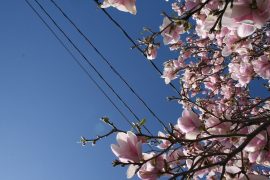Norman Wirzba is the Gilbert T. Rowe Distinguished Professor of Theology at Duke Divinity School. The author of six books, he has also edited numerous volumes of theology and agrarian literature, including The Essential Agrarian Reader and The Art of the Commonplace: The Agrarian Essays of Wendell Berry. We spoke on the phone in January and what follows is an edited version of that conversation. In March, Wirzba will host a conference at Duke sponsored by the Henry Luce Foundation called Hope for a Planet in Peril, that will bring together various scholars, writers, and climate activists to discuss what it means to be alive at this moment of the Anthropocene.
Jason Myers: Tell me a little bit about what’s informing your thinking for this conference and your teaching in general at the moment.
Norman Wirzba: I’ve always been interested in the larger frame questions about humanity’s place in the world. I think many churches nowadays are fairly oblivious to these questions, and this has profound consequences. For many Christians, spirituality is a disembodied and otherworldly enterprise. If we can’t speak meaningfully about the embodied lives of the people in our communities, and the fleshy relationships that join us to plants, animals, water systems, soils, and energy systems, then we have failed as theologians. People are easily bored with theology, they think it’s an arcane discourse that doesn’t touch upon ordinary lives, when theology is intended to illuminate our day to day embodied experience in light of the reality of God. Much theological thinking has lost its way. There’s no reason why we should think Creation care is some boutique interest that doesn’t have daily significance in every community. The fact that churches can think that the care of the planet, of neighborhoods, of public health and proper nutrition, are not central to their mission – that’s a theological catastrophe. How do we make Christian faith incarnate again? Divinity students are becoming much more interested in how essential Creation care is. Besides being stale, they are seeing how theological categories often have the effect of insulating people from these real tangible questions. If you’re thinking about food from production to storage to distribution – the sources of our nurture and shared life — then theology can go to work and contribute a lot. Do we have theologians reflecting enough on property or on economic policies that are producing glad and joyful hearts like the Acts communities were producing? The agendas for theology often become unmoored from our embodied experience. How we construct built environments that sustain all of life — that’s not a boutique issue. The quality of the food we eat and the water we drink, and the sources of energy that fuel our living – these are not matters we take up when we have nothing better to do.
JM: What led you to become a professor of theology? And how did agrarianism become such a focus of your writing and teaching?
NW: I grew up in southern Alberta. For the longest time I thought I was going to be a farmer. I absolutely loved the life. I love being outside, working with animals, making things. It’s hard, sometimes it’s miserable, but it’s still really honest and rewarding work. When I came of age in the 80s, the bankers were telling us we needed to expand. Farming changed within my lifetime so that now you basically just manage enormous financial debt, and it’s enormously stressful to make that operation fly. I had professors in the history department where I went to college who convinced me to pursue an academic life. I did a PhD in philosophy and thought I was done with agriculture. I started teaching in Saskatchewan, then moved to Kentucky. A friend recommended Wendell Berry’s work to me. I’d never read him before. When I read The Unsettling of America, I saw the story of my own family. Wendell agreed to meet with me and we became friends. So I had a formal education, and then a second education with Wendell, who is just a luminous individual. The work he has introduced me to has transformed everything. His familiarity with all kinds of literature is extraordinary: Western, Eastern, ancient, contemporary agrarian writers. His friendship and his instruction have helped me to integrate my own loves with my academic loves. How does our way of inhabiting the world change the way we think philosophically and theologically, and vice versa, when the lens of analysis is agricultural labor?
JM: In your essay “A Priestly Approach to Environmental Theology,” you present three priestly practices as ways of imagining a more holistic and ecologically considerate life with God: sacrifice, asceticism, and gratitude. What are the ways you currently are trying to live these practices, and how do you go about teaching them to your students?
NW: One of the things that’s central, and that comes out of a sacrificial understanding of life, is that you need to suspend the temptation to denounce others and refuse the desire to be innocent, somehow above the fray, and not involved in the pain and suffering that saturate our world. You discover the minute you attend to embodied life – eating, procreating, dying – we are deeply implicated and none of us are ever innocent. This allows for a much more charitable, much more humble position in the world. It reminds us of how much we don’t understand and how easily we contribute to the harm in the world. If you’ve lived among farmers, you discover they don’t talk very much, not because they’re stupid, but because they recognize there’s very little we really understand. We are constantly in the presence of realities that overwhelm us with their magnificence, terror, mercy, and beauty. This way of seeing life opens up more abundant intellectual work because we are committed to discovery before rushing to comprehension and explanation. We can dare to be wrong and merciful with each other. We are all fundamentally confused and bewildered by worlds of beauty and pain that exceed our sympathy and imagining, and whether we admit it or not, we will say things inadequately or incorrectly. The educational task is not just to show us where we’re wrong, but to reveal better ways of being present to and with each other. This kind of education has affinity with hospitality, and I mean that in a deeper sense than southern hospitality. We welcome others, even people we might not be inclined to welcome, in order to be transformed by them, and then be a source of nurture and help to them.
JM: Your discussion of altars in this essay calls to mind Barbara Brown Taylor’s An Altar in the World. One chapter in her book, “The Practice of Saying No: Sabbath” also overlaps with your focus on the importance of rest in spiritual practice. How do you remember the Sabbath?
NW: The thing I like to emphasize about Sabbath is, it’s not first and foremost about saying “no”. There’s an element of stopping, for sure, that relates directly to learning how to be in the places we are. But this is in service of a profoundly positive movement. So much of what we do in day to day living turns out not to be life affirming. Why? Because our minds start with discontent and ingratitude. We don’t take the time to appreciate where we are, who we are with, and what we have as gifts of a loving God. Our culture is profoundly anti-sabbath. It constantly tells us we need to have more and do more. Becoming mindless consumers we do a lot of damage to our communities and places, and we are draining the earth of its fertility and wealth. If we think of a shopping mall as an anti-sabbath construction, altars represent a profoundly different sensibility because they communicate that the point of life is to give and receive out of a posture of gratitude. Because altars are places of self-giving and the offering of gifts to God, they reflect the conviction that life is not for the purposes of possession but for sharing and for delighting. This is what God does on the first Shabbat. God comes into the presence of things so as to delight in their goodness and beauty. This is what we should be doing in our Sabbath observance. Being on a walk and recognizing how much others mean to us; cooking meals and enjoying meals with others are profoundly sabbath acts that create spaces where we might remember the gifts that others are to us. Acquisitive and social media culture are premised on not having enough, not being enough. This corrodes the soul. Sabbath reminds us we are surrounded by the love of others and ultimately the love of God. It’s profoundly healing.
JM: You’ve already talked some about the significance of your friendship with Wendell Berry. How have your encounters with his writing shaped your theology and your teaching? Are there other writers whose ways of incorporating care of Creation and care of community into their work inspire you? What other writers inspire you?
NW: If you know Wendell, he says he came into adulthood at precisely a time when there was an old tradition still functioning well, driven primarily by animal and human power rather than machine power. He absorbed a lot of the lore, experience, and insight of Henry county Kentucky. He was around and conscious at that stage to see that this was something very important, but also on the way out. Had he been born even a few years later, that world would have passed him by. There’s a particular kind of machine mentality that emerges after World War II, that became very present in agricultural communities. He’s able to bring this older world to light. He’s not nostalgic. What he’s very clear about is we should try to learn from these traditions even though they were fraught with violence, brutality, racism, and xenophobia. We need the help of indigenous and agrarian traditions, not to turn back to 1920. Nobody wants to go back there. But there is something to learn from the past about work and reliance on each other, about our dependence on land and fellow creatures. We need to find ways to listen to marginalized people, those who have been most connected to life’s processes through their labor. Wendell’s work communicates our need to imagine a better way to live in present challenges while not being closed off from the wisdom of the past. People often accuse Wendell of being a nostalgic writer. If you pay attention to the history of the term nostalgia, it was developed by doctors attempting to diagnose people who were far from home and became physically ill from a longing for home. In this respect they reflected indigenous people who have spoken often about displacement as a kind of death. Nostalgia in this positive sense points to the human need of and love for a place. We have to be careful, however, because there’s also a negative framing of nostalgia that can be dishonest about one’s home, and often overlook its racist, xenophobic, and violent histories. That’s clearly a problem and needs to be resisted. It’s worth noting that traditional communities were often closed to outsiders and suspicious of them, because outsiders often came to mine and exploit the community and its resources. That is one way to write the history of agriculture across the world: farming communities exploited by wealthy and powerful elites. I wish I had more time to read fiction. Lately I have been reading up on trees. The Overstory by Richard Powers is a fabulous novel. I also loved Barkskins by Annie Proulx. Robert Pogue Harrison wrote a wonderful book called Forests: The Shadow of Civilization. He’s a really good person to read on big cultural themes. I like Mary Oliver’s work a great deal. I still love to read Thoreau, and more recently Barry Lopez and Robert Macfarlane. Guy Vanderhaeghe’s novels about the west are wonderful.
JM: In the introduction to From Nature to Creation, you characterize God as “the one who constantly desires to live intimately with us here on earth.” Where are you finding that intimacy these days? For people who might self-describe as “spiritual but not religious” or atheist, how would you talk about this intimacy?
NW: One of the reasons theology has become difficult for people is that it starts with a God far away, either uninterested in or angry with us. But if you think about God as the creator who, as the first action creates the world as an expression of God’s love for the world, then God is present in every created thing and every living process. God’s first communication is in your own body, in your breathing, eating, sleeping, playing sports, making music, making love. Any time you move at all, you are borrowing and participating in the breath of God. Do you encounter people and get serious with them, dig deeply into places, grow something, make meals, savor the taste of the food you eat, or work to create useful and beautiful things? These are ways to get to know and appreciate the world God makes and daily sustains. It’s easy to inhabit oblivion, mostly inattentive to where we are and who we are with. Rather than being in places, we often only move through them. A Sabbath sensibility helps us rethink our daily practices so that we might find the love of God at work where we are, the love of God made flesh.





